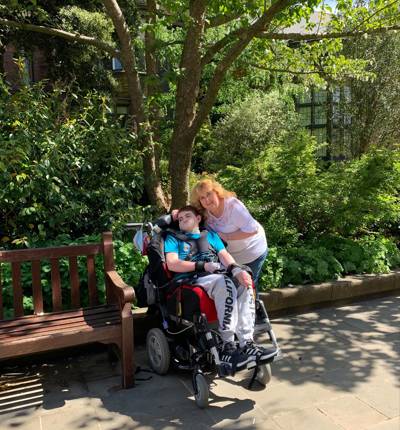
Severely disabled man receives permission to judicially review hospital-stay benefits rule but faces losing his Motability car lifeline
A severely disabled man faces losing his lifeline Motability car in the latest blow he has suffered as a result of the enforcement of a benefits rule that he has just received permission to challenge in the courts.
Posted on 25 February 2022
Cameron Mitchell, aged 20, of Carlisle, has to return his Motability car by Thursday, 3 March despite the fact that he is wholly dependent on it for transport between his home, where he lives three days a week, and hospital where he stays for the rest of the week.
Cameron, through his mother and Deputy, Nicola Clulow, is challenging benefits regulations which put on hold Cameron’s Personal Independence Payments (PIP) and Nicola’s Carer’s Allowance after he spent 28 days in hospital, even though he continued to require his parents’ care whilst in hospital.
This week Cameron was granted permission to go ahead with his judicial review of Regulations 29 and 30 of the Social Security (Personal Independence Payment) Regulations 2013 which he argues are discriminatory and irrational. Cameron’s legal arguments will be presented in a High Court hearing later this year after the court agreed that his claim was ‘arguable’.
However, in the months since the legal challenge was launched, Cameron and Nicola have been struggling to deal with the consequences of the enforcement of the rule, the latest of which means the loss of the Motability car.
In December 2021, Cameron’s mum received letters asking her to repay overpayments of PIP and her Carer’s Allowance that the Department of Work and Pensions (DWP) had made while Cameron was in hospital from December 2020.
Leigh Day solicitor Carolin Ott wrote to the DWP asking them not to cut Cameron’s benefit package or claw back any overpayment until a decision had been made by the courts about his legal challenge to the 28-day rule and in response the DWP agreed to stop clawing back overpayments for at least six months.
However, the mobility element of Cameron’s PIP that had been paid to Motability for the car while Cameron was in hospital was still clawed back from Motability in late 2021 (even though the car was needed by his parents to continue caring for him while he was in hospital and later in hospice care). Motability say that without payment, the vehicle needs to now be returned.
Leigh Day has written to the Secretary of State for Work and Pension’s lawyers again asking for the matter to be resolved urgently and has also written to Motability asking for an extension to allow the issue to be resolved by the DWP.
Nicola is deeply distressed by the prospect of losing the vehicle and can’t see how Cameron would be able to spend any time at home if the vehicle is taken away. Cameron has benefited from being able to receive care at home which is an important part of the transition to his full-time home care package. The loss of the Motability car would have a serious, detrimental impact on him and his family.
In his judicial review challenge of the lawfulness of the suspension of PIP and his mum’s Carer’s Allowance during his extended hospital stay, Cameron is arguing that the ‘hospitalisation rule’ breaches his rights because it directly discriminates against him (a person with profound and multiple learning disabilities (PMLD) requiring hospitalisation for a period of more than 28 days) as compared to those with PMLD who are hospitalised for less than 28 days.
He is also arguing that the ‘hospitalisation rule’ indirectly discriminates against those who have PMLD or treats those with PMLD the same as others when it should be treating them differently in recognition of their disability-related needs (which mean that they require care from ‘known carers’, people who know them and their needs whilst they are in hospital). He also argues that the rule is irrational because it cuts across the purpose of PIP.
Nicola Clulow said:
“Cameron has been stuck living in intensive care first in Newcastle, then in Carlisle for almost 15 months now. Not because he's ill but due to problems and delays in providing a home care package that can meet his complex special needs.
“He's 20 years old and has had to spend days and nights for months watching very sick people who often don't survive and despite his lack of communication it's clear to everyone that he was switching off from the world, was depressed and just had no interest in life.
“Contact with the outside world and the ability to go home to be with family are crucial for him. To go out, and especially to go home Cameron requires a great deal of equipment to go with him and this would be impossible without his Motability car.
“Having been called on 21st February 2022 by Motability to say his vehicle must be returned on Thursday 3rd March was one of the most difficult and upsetting situations we have faced because it means that Cameron will once again have to simply stay looking at the four walls of the Intensive Care unit and not get home.”
Leigh Day solicitor Carolin Ott said:
“We are very pleased that the court has granted our client permission for a judicial review of the hospitalisation rule which has suspended his PIP and his mother’s Carer’s Allowance, but are deeply concerned by the detrimental impact of the enforcement of the rule whilst Cameron awaits his day in court.
“Cameron is a young man with profound and multiple learning disabilities (PMLD) and like many others with PMLD is dependent on input from his known carers. In circumstances where the NHS alone can’t cover his care needs, his PIP should have never been suspended in the first place. The detrimental impact of that suspension, which on top of causing loss of income and stress is now also causing his family to lose his Motability car, is ongoing and we hope that it will be urgently addressed.”
Cameron is represented by Carolin Ott and Tessa Gregory of Leigh Day, and Chris Buttler QC and Katy Sheridan of Matrix Chambers.

Cameron Mitchell launches court challenge to loss of Personal Independence Benefit payments after 28 days in hospital
A severely disabled young man is applying for judicial review of a rule which halted payment of his welfare benefit after he had been in hospital for more than four weeks.

Severely disabled benefits claimants win legal challenge over loss of income caused by move on to Universal Credit
Two severely disabled men known as TP and AR have won yet another legal challenge over the Department of Work and Pensions’ (DWP) failure to provide adequate transitional payments to protect them and others from a cliff-edge loss of income following their move on to Universal Credit (UC).


